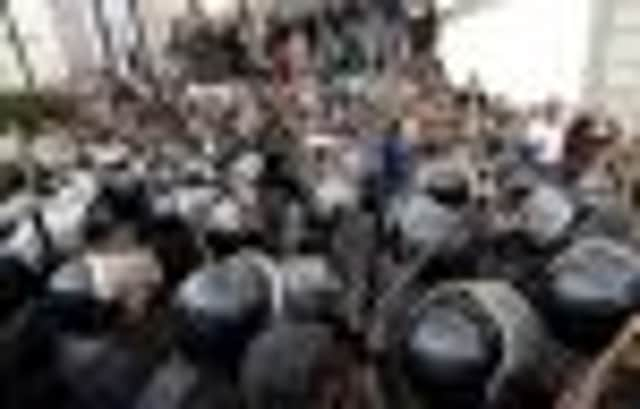Egyptian police use tear gas against protesters


Security officials said a total of 860 protesters had been rounded up nationwide since Tuesday when tens of thousands turned out for the largest protests in years – inspired by the uprising in Tunisia.
They demanded president Hosni Mubarak’s removal and a solution to grinding poverty, rising prices and high unemployment.
Advertisement
Hide AdAdvertisement
Hide AdAfter nightfall yesterday more than 2,000 demonstrators were marching on a Nile-side road when dozens of riot police with helmets and shields charged the crowd. It was a scene repeated throughout the day wherever demonstrators tried to gather.
They were the latest in outbursts of political discontent in Egypt that have been growing more frequent and more intense over the past year. Protests have erupted sporadically over police brutality, poverty and food prices, government corruption and mismanagement, and more recently sectarian strife between Christians and Muslims. Parliamentary elections in November were widely decried as fraudulent.
Many in Egypt see these events as signs of the authoritarian president’s vulnerability in an election year. There is speculation 82-year-old Mr Mubarak, who has been in power for nearly 30 years and recently experienced serious health problems, may be setting his son Gamal up for hereditary succession.
But there is considerable public opposition and, according to leaked United States diplomatic memos, it does not meet with the approval of the powerful armed forces. However, the regime’s tight hold on power has made it virtually impossible for any serious alternative to Mr Mubarak to emerge.
Advertisement
Hide AdAdvertisement
Hide AdThe crackdown by authorities brought harsh words from European leaders, who expressed concern and said the events underline the need for democratisation and respect for human and civil rights.
Activists used social networking sites to call for fresh demonstrations but Facebook appeared to be at least partially blocked yesterday afternoon. Twitter and mobile phones appeared to be sporadically blocked as well.
The Interior Ministry had warned police would not tolerate any gatherings, and thousands were out on the streets poised to crack down quickly on any new signs of unrest after clashes on Tuesday in which three demonstrators and one police officer were killed.
Thousands of police in riot gear and backed by armoured vehicles took up posts in Cairo on bridges across the Nile, at major junctions and squares as well as outside key installations such as the state TV building and the headquarters of Mr Mubarak’s ruling National Democratic Party.
Advertisement
Hide AdAdvertisement
Hide AdPolice fired tear gas to disperse a crowd of several hundred activists on a main commercial thoroughfare in central Cairo, chasing them through side streets as both sides pelted each other with rocks.
In the city of Suez east of Cairo, an angry crowd of about 1,000 gathered outside the mortuary demanding to take possession and bury the body of one of three protesters who died in clashes.
In the southern city of Assiut, eyewitnesses said riot police set upon some 100 activists staging an anti-government protest , beating them up with batons and arresting nearly half of them.
Many protesters said they had been inspired by the uprising in Tunisia – even invoking some of the identical slogans heard in the other north African nation.
Advertisement
Hide AdAdvertisement
Hide AdProtesters have vented anger over a host of ills in Egyptian society. Nearly half of all Egyptians live under or just above the poverty line, set by the World Bank at $2 a day. Widespread poverty, high unemployment and rising food prices pose a threat to Mr Mubarak’s regime while tensions between Muslims and Christians are adding to the nation’s woes.
A parliamentary election marred by allegations of widespread fraud saw Mr Mubarak’s ruling National Democratic Party win all but a small number of the chamber’s 518 seats.
He and his son have vowed to ensure that economic reforms help the poor but so far this has not happened.